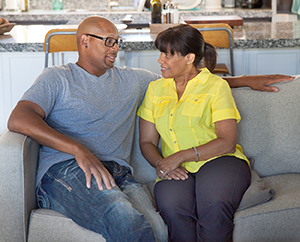Colostomy: Adjusting to Your Body
Getting used to a colostomy may take time. Learning to care for it and the changes in your body can be a challenge. Keep in mind that you're still the same person you were before the colostomy. And you can still do many of the things that you love. This sheet offers tips to help you adjust to having a colostomy.
Accepting yourself
It’s normal to feel anxious about how your body has changed. But a healthcare provider will show you how to care for the colostomy and yourself. This may be a wound, ostomy, and continence (WOC) nurse. A WOC nurse is specially trained to care for people who have an ostomy. Soon, caring for your colostomy will become part of your daily routine—like bathing or brushing your teeth.
Telling others
It’s your choice to tell others about your colostomy. No one can tell by looking at you or being near you that you have a colostomy. Your pouch won’t bulge or smell if it’s put on right. You may worry about how to tell possible partners that you have a colostomy. It’s best to wait until you feel at ease with the person. But talk about it before you decide to have sex.

Sex and intimacy
You may have some concerns about how a colostomy will affect your sexuality. This is normal. Talk with your WOC nurse about fears you may have. They can offer help and advice. Also, share your feelings with your partner. People with colostomies still have sex, date, marry, and have children. Below are some tips:
-
Give yourself time. Wait until you feel well and relaxed. Until you're ready, you can express love in other ways, such as hugging, kissing, and caressing.
-
Empty your pouch before you have sex. You may want to wear a pouch cover or a shirt over the pouch. Or you might tuck the pouch under a soft belt or inside underwear with an open crotch.
-
Don't put anything in the stoma during sex.
Get support
Talking with another person who has had a colostomy can help, too. Members of the United Ostomy Associations of America (UOAA) are glad to answer questions and talk with you about any concerns you have.
For loved ones
The person you love hasn't changed because they have a colostomy. But just remember it may take time for your loved one to adjust. They may be depressed or withdrawn at first. Do your best to support your loved one as they get used to having a colostomy. They may also want help caring for the colostomy at first. A WOC nurse or other healthcare provider can show you what to do. If you have questions or concerns, you can talk with someone from the United Ostomy Associations of America (UOAA). The UOAA is a support group for people with ostomies, their loved ones, and caregivers. See their contact information above.